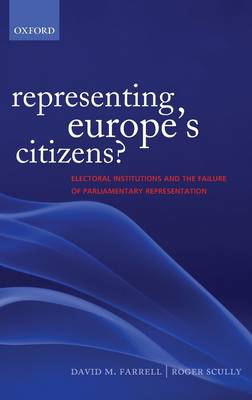
- Afhalen na 1 uur in een winkel met voorraad
- Gratis thuislevering in België vanaf € 30
- Ruim aanbod met 7 miljoen producten
- Afhalen na 1 uur in een winkel met voorraad
- Gratis thuislevering in België vanaf € 30
- Ruim aanbod met 7 miljoen producten
Zoeken
Representing Europe's Citizens?
Electoral Institutions and the Failure of Parliamentary Representation
David M Farrell, Roger Scully
Hardcover | Engels
€ 130,95
+ 261 punten
Omschrijving
The past 15 years have seen declining public support for European integration, and widespread suggestions that a legitimacy crisis faces the European Union (EU). Many in the EU have believed that this problem could be effectively tackled by vesting greater powers in the European Parliament (EP), the Union's only directly-elected institution. The central argument of this book is that, while considerable efforts have been made to increase the status of the EP, it is in crucial respects a failure as a representative body. This failure is grounded in the manner in which the parliament is elected. The electoral systems used for EP elections in many EU countries are actively obstructive of Europe's voters being represented in the way that they are most likely to respond positively towards. While the behaviour of EP members is shaped strongly by the electoral systems under which they are elected (which vary across the 25 member-states of the EU), the electoral systems currently in place push most of them to behave in ways contrary to what citizens desire. Drawing on public opinion data, surveys of MEPs and considerable qualitative interview evidence, this book shows that the failure of parliamentary representation in the EU has a strong foundation in electoral institutions.
Specificaties
Betrokkenen
- Auteur(s):
- Uitgeverij:
Inhoud
- Aantal bladzijden:
- 256
- Taal:
- Engels
Eigenschappen
- Productcode (EAN):
- 9780199285020
- Verschijningsdatum:
- 12/07/2007
- Uitvoering:
- Hardcover
- Formaat:
- Genaaid
- Afmetingen:
- 163 mm x 241 mm
- Gewicht:
- 526 g

Alleen bij Standaard Boekhandel
+ 261 punten op je klantenkaart van Standaard Boekhandel
Beoordelingen
We publiceren alleen reviews die voldoen aan de voorwaarden voor reviews. Bekijk onze voorwaarden voor reviews.











